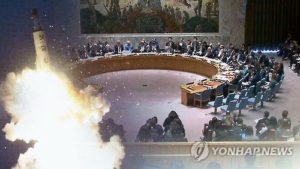
Yonhap:
The United Nations Security Council (UNSC) is seeking to adopt a press statement to condemn North Korea’s latest launch of a submarine-launched ballistic missile (SLBM), officials said Wednesday following an emergency meeting on the issue.
Member nations of the UNSC agreed to push for the press statement after the council held an emergency meeting to discuss North Korea’s latest SLBM launch at the request of South Korea, the U.S. and Japan, the officials who attended the closed-door meeting said.
“There was a general sense of condemnation by most members of the council,” Malaysia’s Ambassador to the U.N. Ramlan Bin Ibrahim, who chaired the meeting, told reporters.
The U.S. is drafting a press statement and the UNSC members will consider it, Ibrahim said.
In a statement issued ahead of the meeting, U.N. Secretary-General Ban Ki-moon denounced the SLBM launch by North Korea, saying he is very concerned with North Korea’s dismissal of international calls for an attitude change.
Ban said the latest launch is a clear violation of UNSC resolutions and it hinders peace and security of the Korean Peninsula.
He called on the North to take the necessary measures to ease tensions and come back to the negotiating table for its denuclearization.
In the early morning of Wednesday, North Korea launched an SLBM from the East Sea, the country’s third SLBM test this year.
The missile flew some 500 kilometers before landing in waters near Japan, demonstrating an improvement in performance from previous SLBM launches.
Previous UNSC resolutions, including the latest one adopted in March, Resolution 2270, ban North Korea from tests or development of nuclear or ballistic missile technology.
The UNSC’s former push to adopt a press statement on Pyongyang’s defiant ballistic missile launch on Aug. 3 was thwarted by veto-wielding China’s demand to include its opposition to Seoul and Washington’s plan to deploy a high-tech missile defense system in South Korea.
China, however, is known to have not brought up the U.S.-made Terminal High Altitude Area Defense (THAAD) system this time, while making clear its opposition to the North’s SLBM launch, a diplomatic source said, asking not to be named.
The deployment of THAAD has been seen as driving a wedge against efforts to maintain a concerted response to North Korea’s evolving nuclear and missile programs. China has protested that the North Korean nuclear issue should not be a pretext for the deployment of the anti-missile system and its powerful radar.
